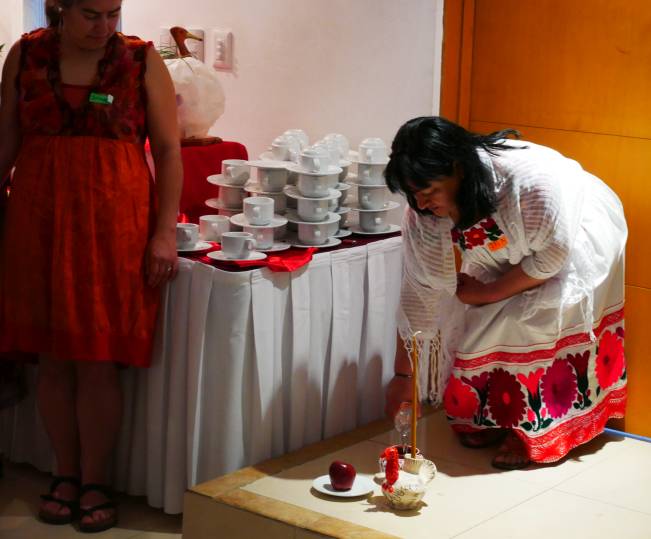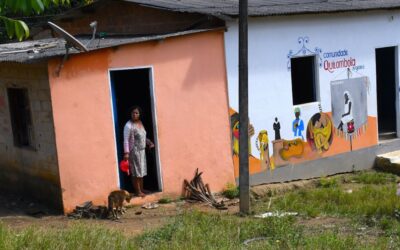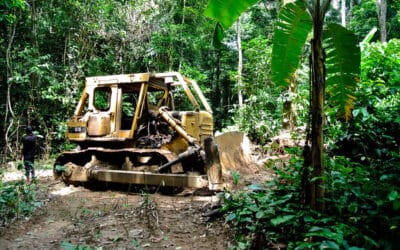2 Dec: Ministers at the COP13 of the CBD in Cancun Mexico, are failing to recognize the key role of women in biodiversity conservation in the proposed Cancun declaration [1], despite the conference focus on mainstreaming the conservation and sustainable use of biodiversity for well-being [2].
The Global Forest Coalition and Women’s groups attending the Convention on Biodiversity, which starts with a High-Level segment today, will award those governments that are clearly championing gender equality in order to remedy this error. Throughout the COP, they will award flower pins to such parties[3].
“Mainstreaming biodiversity for well-being is the official theme of COP13, but instead of including women, indigenous peoples and local communities who carry out genuine conservation work on the ground, there is a disproportionate emphasis on engaging the private sector and using market-based approaches. We cannot rely on the private sector to solve the biodiversity loss that they have created in the first place,” said Mrinalini Rai of the Global Forest Coalition.
Women’s groups have been demanding gender-responsive policies to protect biodiversity at the CBD. Women play a key role in conservation at the community level- for example through retaining traditional crop varieties, agro-forestry and agroecology practices, or seed conservation. They are the keepers of traditional knowledge, but their role has not been amply recognized by the CBD.
A recent study of National Biodiversity Plans (NBSAPS) [4] to implement the CBD found that most did not recognize women, and those that did characterized them as vulnerable and passive beneficiaries [5].
“Women should be seen as agents of change instead of beneficiaries or as vulnerable,” said Rai.
Instead, policy support is going to corporations though programs like certification schemes for forest products, which deprive communities of access to land, and fuel consumerism.
There are also ‘perverse incentives’ [6] like subsidies toward large-scale industrial activities in agriculture, forestry and fishing, which significantly threaten the territories and areas, ways of life and conservation efforts of women, indigenous peoples and local communities.
GFC is working with more than 60 indigenous communities in 22 countries as part of the Community Conservation Resilience Initiative to highlight the key conservation role of Indigenous Peoples, local communities and women, and the threats they face [7].
Notes
[1] The 13th meeting of the Conference of the Parties (COP13) to the Convention on Biological Diversity will take place in Cancun, Mexico from the 2-17 December. It starts with a High Level Segment meeting of ministers and heads of delegations on 2 and 3rd December who will adopt a political declaration called the Cancun declaration on 3 Dec. Link to draft: https://www.cbd.int/cop/cop-13/hls/CD/Draft-Cancun-Declaration-July2016-en.pdf
[2] As guided by the CBD Strategic Plan for Biodiversity 2011-2020 and Aichi Targets, State Parties are mandated by the CBD to mainstream biodiversity, that is, to integrate the conservation and sustainable use of biodiversity into key sectors and policies, for example, in the primary sectors of agriculture, forests and fisheries.
[3] A Press conference will take place on Monday 5 December 2016, 11:00-11:25 at the Moon Palace “Women’s group awards champions of gender mainstreaming in the CBD”. For more info check our website: https://globalforestcoalition.org/cop13cancun/
[4] National Biodiversity Strategies and Action Plans (NBSAPs) are the principal instruments for implementing the Convention on Biological Diversity at the national level.
[5] See https://www.cbd.int/doc/meetings/cop/cop-13/official/cop-13-08-add3-en.pdf
[6] Perverse incentives are in the form of policy support towards large-scale industrial programs in agriculture, forestry or fisheries that threaten biodiversity. The Strategic Plan of the CBD calls on countries to remove or redirect such perverse incentives before 2020.
[7] The Community Conservation Resilience Initiative (CCRI) is a joint effort of a large number of Indigenous peoples’ organizations (IPOs), women’s groups and NGOs and coordinated by the Global Forest Coalition, who are carrying out bottom-up assessments of community-led conservation efforts in communities across at least 22 countries. The CCRI aims to contribute to the implementation of the CBD’s Strategic Plan for Biodiversity 2011-2020 by providing advice on the most effective and appropriate forms of support for community conservation. See: http://bit.ly/1SwrcBl
For more information please contact:
Ashlesha Khadse (Media Officer)
+ 52 9984111965 (Mexico)
ashlesha@globalforestcoalition.org
Website: https://globalforestcoalition.org/media
Social media
Facebook: bit.ly/gfc123
Instagram: global.forest
Twitter: @gfc123




